Dr. Mistry Answers Listener Question on ED, Dutasteride, and Testosterone Therapy [PODCAST]
RELATED: How to Test Testosterone Levels at Home | 5 Best At Home Testosterone Test
Dr. Mistry Answers Listener Question on ED, Dutasteride, and Testosterone Therapy
![Dr. Mistry Answers Listener Question On Ed, Dutasteride, And Testosterone Therapy [Podcast] 1 testosterone-background-medicaments-composition-stethoscope-mix testosterone therapy SS](https://mightygoodness.com/wp-content/uploads/2021/10/testosterone-background-medicaments-composition-stethoscope-mix-testosterone-therapy-SS.jpg)
In this segment, Dr. Mistry and Donna Lee answer a listener's question about the impact medication can have on testosterone levels. This 73YO man was diagnosed with enlarged prostate with urethral obstruction and placed on Dutasteride and Tamsulosin to shrink the prostate so a Rezum procedure could be performed. Shortly thereafter, he began having symptoms of low testosterone, and lab work confirmed he had a T level of 400 with no free testosterone.
His urologist stopped the Dutasteride and began giving him 100 milligrams of Testosterone Cypionate weekly, which greatly improved his symptoms. But after 9 weeks of hormone therapy, his T level had jumped to over 1500 and he was immediately taken off the T injections. He wonders what caused his T level elevation and whether it would be safe to resume T therapy because it was very helpful.
Dr. Mistry explains that medications like Dutasteride and Finasteride, often taken for hair growth, can definitely cause symptoms of ED as well as lowered sperm counts. Younger men or men trying to conceive should be aware of the risk of these side effects. In the case of our listener, it is likely that the sudden surge in his T levels may be a simple lab error since diagnostic machines often fail and have to be recalibrated. Because hormone therapy was so beneficial in mitigating his symptoms, he should definitely find a urologist who is comfortable with prescribing testosterone for men's health and try again.
If you or someone you love is experiencing symptoms of ED or low testosterone after taking Dutasteride or Finasteride, please call us today and check out our podcast on what we call “post-Finasteride syndrome.”
Up Next:
- 5 Proven Ways to Boost Your Testosterone Levels Naturally
- 21 “Healthy Foods” Making YOU Fat and Killing your Testosterone [PODCAST]
- What Blood Pressure Medication Does Not Cause Erectile Dysfunction?
Please stay connected with us on Facebook, Twitter, Instagram, and Pinterest, and make sure to join our community of healthy living and minded people here.
Trending
Tongue Color | 7 Scary Tongue Color Meanings
Lecithin Benefits and Side Effects: 10 Surprising Truths
Get Updates
SIGN UP FOR OUR NEWSLETTER TODAY


